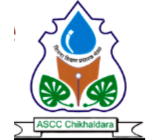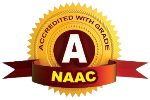Best Practice 2018-19
Best Practice I :-
1. Title of the practice: Employability skills of students
2. Objectives
- To enhance employability skills of students
- To promote the practice of earn while learn
3. The Context
As most of the students come from below poverty level background they cannot afford education. Just to make both ends meet their entire family needs to work. Keeping someone in education is keeping someone out from earning bread. As an attempt to address this problem we established the ‘Entrepreneurship Development Cell’. The Entrepreneurship Development Cell works to promote the practice of ‘Earn while Learn’ and conducts various skill development training programmes leading to self-wage employment. Along with this some other departments of the college try their utmost to open up a few avenues as regards employment.
4. The Practice
Workshop on Bamboo Crafts and sale:-
The ED cell in collaboration with an NGO in Melghat ‘Sampurna Bamboo Kendra’, has been working for the betterment of tribal. A 21-days training on Bamboo Crafts was arranged. Around 40 students were benefited from this. During this training they manufactured the various crafts worth Rs. 6000.00. We facilitated the sale of goods through the outlets and stalls. All students could improve their earning. We carry out the training every year. Our parent society donates the required tool kit to every trainee. Students prepare the crafts in spare time. Another training for ‘Rakhi’ Manufacturing from bamboo was also carried out by the cell. Rakhis worth Rs. 4000.00 were made by students.
Training program “Employability enhancement and youth livelihood”:-
This training program was carried out jointly by Mahindra Pride Classroom project of Nandi Foundation, college IQAC and Career Guidance Cell of college. This was in pursuance of the vision and mission of collage. Team work, communication skills, time management, proper grooming and hygiene for professional enhancement, interview skills such were the topics addressed under the training program. 42 students participated in this 8 days long program. The training was conducted with ample use of ICT tools.
Add course on “Soft Skills development”:-
This one week long course was conducted by collage career guidance cell. Some fifty students participated in the course.
Understanding yourself, Goal Setting and Achieving, Self Talk, Communication Skills (Verbal) Body Language and presentation skills were the topics covered under this seven day long course. The course is carried out every year by Career Guidance Cell.
Training programme on “Honey Processing”:-
As the Melghat region is a rich source of natural honey, we have honey bee keeping centre which creates awareness about Honey bee keeping and popularizes various methods for successful honey bee keeping. We have introduced B.Sc. Apiculture and other short term training programmes for the students and local people in order to provide them need based training. We have a honey processing plant and we provide honey processing services on minimal rates. The centre also works for the conservation of forest and environment by cultivating plants necessary for successful honey bee keeping with the help of varied flora richly available in Melghat. A 05 day long training programme on “Honey Processing” was arranged wherein 07 students participated.
5. Evidence of Success:
All these initiatives could create employability awareness among students. Some students are now in possession of skills which could prove as a regular income source. Some students could earn partially and the thing to note is that they have gained confidence that once there education is over they would be in a position to easily start self employment endeavors.
6. Problems Encountered and Resources Required:
Melghat not only lacks industrial areas but also lacks the required infrastructure. No industry exists here so we find it difficult to easily expose our students to industrial atmosphere. For first hand industrial experiences we have to move to the district place which is also not adequately industrialized and we here require financial resources. Moreover, there are limitations to the uses of natural resources here due to rigorous rules and regulations by Melghat Reserved Tiger Project.
Best Practice II :-
1. Title of the practice: Environment-friendly initiatives
2. Objective
- Create environmental awareness among the students, staff and society
- Initiate environmental friendly steps like conservation, recycling, propagation and protection
- Contribute to the maintenance of rich diversity of flora and fauna in the region of Melghat
- To address pollution
3. The Context
We being the higher education institute here in the lap of mother nature it becomes our prime most concern to sustain environment here. We carry out a number of activities as regards this concern. We do attempt to address the pollution to the best of our capabilities.
4. The Practice
Say No to Plastic Bags:-
Under the program of Swachha Bharat Swastha Bharat Department of Chemistry runs Say No to Plastic Bags drive the extension activity since academic session 2014 with the aim to create awareness about plastic bag pollution among the students and local people and to make this town of Chikhaldara entirely plastic free. The sole reason of undertaking this workshop is to make students understand the harm caused by plastic bags and to encourage them to replace plastic bags with paper bags.
Students and local communities are made aware about evil effects of plastic through video clippings, talks, rallies, display boards and brochures etc. Old clothes are collected to prepare bags, which are distributed among local people including tourists.
Recycling of News Paper
In the academic year 2018-19 one day workshop on “Preparation of recycled newspaper bags” was organized under the extension activity Say No to Plastic Bags drive.
In this workshop Dr. Ku. S.N. Gupta, Associate Professor, Department of Chemistry Brijlal Biyani Science College, Amravati instructed the students on how to make paper bags and other articles like pen stand, Dust Bin, Pots, etc. by using old newspapers. The students prepared paper bags along with aforementioned articles. Afterwards they put their name, signature and a message “Say No To Plastics” on the article. All articles were distributed among students with the strong expectation to use it so as to make environment of Chikhaldara plastic free.
Rainwater Harvesting
Department of Geology has been carrying out the extension activity since academic session 2014 on “Rainwater Harvesting” under the program of Swachha Bharat Swastha Bharat. As we do it regularly, Last year the door to door and person to person awareness campaign was carried out by the B.Sc. III students in the Chikhaldara and surrounding villages viz., Aadnadi, Aaladoh, Shahapur, Mariampur, Motha, Pandhari, Dhamangao Gadi, Aamzari, Mdaki and Khatkali villages. During this campaign, the students circulated the pamphlet on rainwater harvesting and also dissipated information on construction of rainwater harvesting structure, need of rainwater harvesting, rules and regulation of rainwater harvesting, proper uses of water, importance of saving water, how to save water, etc. total 580 houses were visited by the students during this campaign. The students encouraged house owner for the construction of rainwater harvesting structures as well as for saving of water.
5. Evidence of Success
We could meet and get in touch with most of the students and people through these programs. We developed sensitization about plastic pollution, rainwater harvesting and other environmental problems. Chikhaldara Municipal Council appreciated us.
6. Problems Encountered and Resources Required
The inhabitants of Melghat are still educationally backward. It is always difficult to convince them to use eco-friendly items like cloth bags and to afford additional expenditure to modify house construction in order to get rain water harvesting in place. Besides they don’t directly encounter any pollution related problem. Their poor financial background also adds to our difficulty. The tourists staying here for a temporary period cannot be re-contacted or re-counseled. The concerning local authorities need to be more sensitive as regard eco-friendliness.


